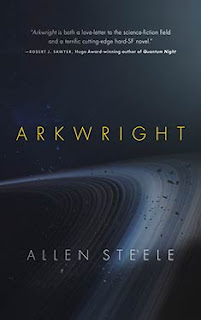Arkwright by Allen Steele
Published: Tor, 2016
The Book:
“Contemporary of science fiction masters Robert Heinlein, Isaac Asimov, and Arthur C. Clarke, Nathan Arkwright is a seminal author of the twentieth century. At the end of his life he becomes reclusive and cantankerous, refusing to appear before or interact with his legion of fans. Little did anyone know, Nathan was putting into motion his true, timeless legacy.
Convinced that humanity cannot survive on Earth, his Arkwright Foundation dedicates itself to creating a colony on an Earth-like planet several light years distant. Fueled by Nathan's legacy, generations of Arkwrights are drawn together, and pulled apart, by the enormity of the task and weight of their name.” ~Allensteele.com
This is technically the first novel I’ve read by Allen Steele, though I enjoyed his stories about the colonization of the planet Coyote as serialized in Asimov’s Science Fiction. This novel was identified by the community at World’s Without End as one of the award-worthy books of 2016.
My Thoughts:
Arkwright is a very different kind of colonization story than you’ll find with Steele’s books about Coyote. Instead of focusing on the details of the project and the people who eventually live on the alien planet, Arkwright primarily follows the Earth-side humans who are behind this monumental effort. The story explores what would drive Nathan Arkwright to establish his foundation and how subsequent generations react to their unchosen connection to the generations-long undertaking. It is a difficult thing to dedicate oneself to a project that spans longer than a human lifetime, and I can’t imagine that everyone would be able to handle such pressure. I’ve had similar thoughts about the architects behind the great cathedrals of Europe, wondering how they might feel knowing that they will not be able to see their life’s work come to completion. This is a relatively short novel, and it spans several generations of Arkwrights who have very different ways of coping with their family heritage. I enjoyed seeing their range of reactions to the Arkwright Foundation, but I felt like I didn’t have enough time with each cast to feel an emotional attachment to the characters.
In the build-up to the establishment of the colonization project, it becomes clear that Arkwright carries a lot of love for the social scene of 1950s science fiction. There are a number of scenes featuring fictional and actual authors of the era, and involving their interaction in conventions and elsewhere. I was a little impatient to get back to the future-focused story, but these nostalgic parts helped me to understand Nathan Arkwright’s motives. I also enjoyed how it highlighted the role of science fiction in inspiring scientific development, something that certainly happens in reality. Science fiction can help us imagine a path to the future, even as it also can point out potential pitfalls of developing technology. In this case, Arkwright’s vision created a foundation that would define his family for many years, and would spur technological development along the way.
After all of this, we do eventually get to see the final outcome of the colonization project. Separated as it is in physical distance and time from the Arkwright family’s story, this part of the novel felt like an extended epilogue. I would have been disappointed if there had been no closure on what happened to the colony ship, so I was happy that this part was included. However, there’s only really enough time to see the situation in broad strokes, when I would have liked to see more detail. Despite the brevity, I appreciated the author’s choice to let his readers move into the future, to see the ‘cathedral’ that was completed long after the builders we met had passed beyond knowing.
My Rating: 3 /5
Arkwright has an interesting premise, focusing on the human side of the development and execution of an extrasolar colonization project. It has a clear fondness for the history of science fiction, and the way that science fiction can inspire developments in technology. It’s also a relatively short book that covers a lot of content, from the inception of the colonization project, through multiple generations of the Arkwright family, all the way through to the project’s culmination. As such, there is not a ton of depth to each segment or each set of characters. I’m still happy I read this one, and I will probably read more work by Steele in the future.

No comments:
Post a Comment